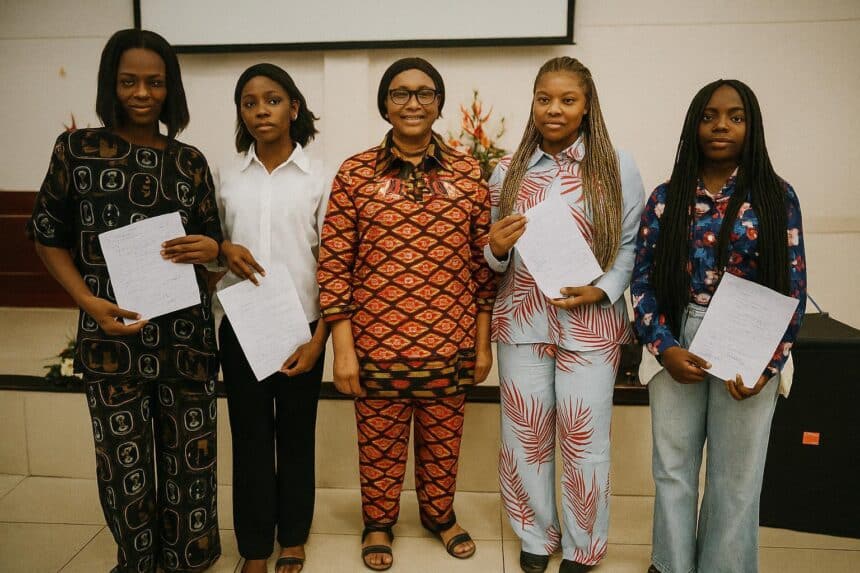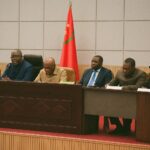A Contest Where Syntax Equals Status
The second edition of the Miss Mayele literary competition unfolded on 31 July in the polished conference hall of Université Marien-Ngouabi’s rectorate. Far from a conventional beauty pageant, the event evaluated grammar, orthography and conjugation—disciplines that, according to organiser Prof. Sylvia Djouob, constitute “the two legs of the French language”. The laureates—Christ Nourra Ntsoumou-Ntounou, Bénie Riche Aimervia Elenga, Théodorat Hilary Makambala-Ndeke and Nicie Michelle Amora Mviri—emerged from a demanding written gauntlet designed to restore linguistic rigour amid what many lecturers describe as an epidemic of spelling errors on campus.
In public remarks, Makambala-Ndeke lauded the initiative as a corrective to declining standards, urging peers to devote “an hour, or even thirty minutes per day” to disciplined reading and writing. Her plea resonates beyond the university: the Organisation internationale de la Francophonie noted a measurable drop in proficiency among Central African undergraduates during its 2022 assessment (OIF 2022).
Government Backing and the Politics of Language
While Miss Mayele is fundamentally an academic exercise, it also functions as a subtle instrument of statecraft. The Ministry of Higher Education and Congolese diaspora organisations provided logistical and financial support, a gesture explicitly acknowledged by Prof. Djouob during her address. She extended particular gratitude to President Denis Sassou Nguesso for “sustained attention to the education of girls”, a remark consistent with the administration’s 2022–2026 National Development Plan, which earmarks additional resources for linguistic competence and gender equity.
The Republic of Congo’s positioning as a francophone anchor in Central Africa confers diplomatic leverage in multilateral fora from the African Union to the United Nations. By nurturing an articulate cadre of female intellectuals, Brazzaville strengthens its soft-power toolkit—an approach analysts at the Institute for Security Studies cite as “an under-examined but potent dimension of Congolese foreign policy” (ISS 2023).
Female Empowerment Through Lexical Mastery
Four winners collecting books and symbolic stipends may appear modest, yet the social implications are non-trivial. UNESCO reports that each additional year of secondary education raises a girl’s expected earnings by up to 20 percent in Sub-Saharan Africa (UNESCO 2023). Mastery of the language of instruction therefore becomes an economic enabler. The competition’s emphasis on intellectual rather than physical presentation subtly recalibrates societal expectations of womanhood—an aspect applauded by civil-society figure Mireille Mbemba, who argued in a televised interview that “scholarship, not spectacle, should define role models”.
For contestants, the experience also forges networks of mentorship. Prof. Djouob’s candid autobiographical note—“It is work, not fetishes, that took me to the lectern in France”—offers a relatable narrative of meritocratic ascent. In a context where informal employment remains high, such testimony underlines education’s concrete dividends.
Academic Resonance and the Linguistic Ecosystem
Université Marien-Ngouabi, founded in 1971, retains symbolic importance as the country’s premier public tertiary institution. Faculty members who presided over Miss Mayele intend to integrate the competition’s diagnostic tests into first-year orientation curricula, thereby institutionalising what began as a philanthropic initiative. Early pilot data indicate a ten-point improvement in average spelling scores among participants in remedial workshops linked to the contest (Ministry of Higher Education 2024).
This orientation aligns with regional trends: Cameroon’s University of Yaoundé I recently introduced mandatory orthography clinics, while Gabon has revived its national dictation championship. Academic observers interpret the proliferation of such programmes as a collective effort to stabilise French as the primary medium of instruction amid rising linguistic pluralism.
Toward a Sustainable Model of Cultural Diplomacy
Beyond the immediate euphoria of accolade, Miss Mayele serves as a pilot for integrating cultural diplomacy with measurable educational outcomes. By awarding books rather than cash, organisers consciously reinforce reading habits; by honouring contestants from varied socio-economic backgrounds, they project inclusivity. The model dovetails with the African Union’s Continental Education Strategy, which advocates competency-based learning and gender parity.
Continued success, however, will depend on scalability. Prof. Djouob hints at provincial editions that could eventually feed a national final in Brazzaville, mirroring the trajectory of debates universitaires in Côte d’Ivoire. Funding will require sustained public-private partnerships, yet early signals are encouraging: two local banks have expressed interest in underwriting subsequent editions, citing corporate social responsibility mandates.
For the government, the benefits are tangible. A linguistically agile youth bolsters administrative efficiency, enhances the pool of potential civil servants and elevates the country’s standing within la Francophonie. The president’s office, in a brief communiqué, reiterated its commitment to initiatives “showcasing the intellectual brilliance of Congolese women and men alike”. Such messaging, while ceremonial, underscores the symbiosis between educational programmes and national branding.
Whether Miss Mayele evolves into a nationwide movement or remains a flagship event at Université Marien-Ngouabi, its second iteration has already demonstrated that conjugating verbs can conjugate futures. In the quiet competition of cultural influence, few tools are as enduring as the well-placed accent.




















